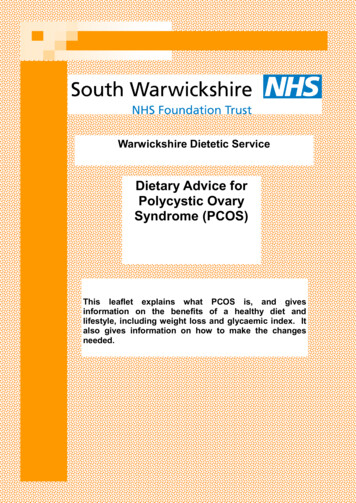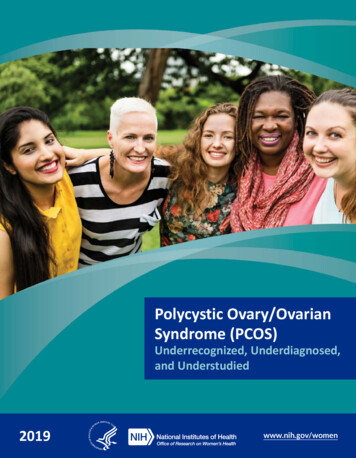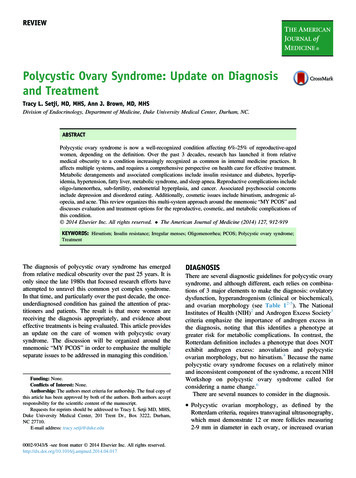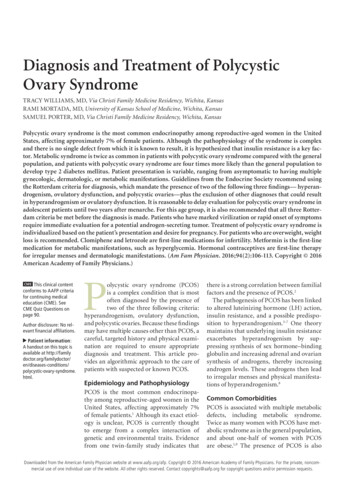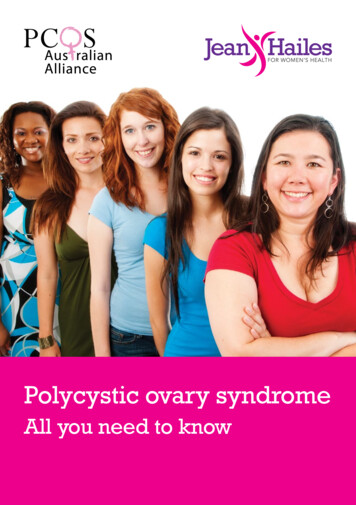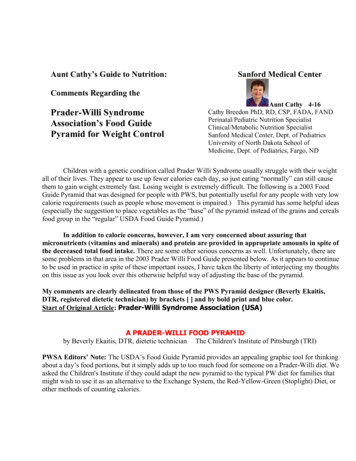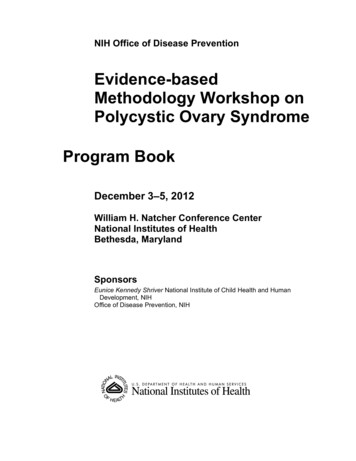
Transcription
NIH Office of Disease PreventionEvidence-basedMethodology Workshop onPolycystic Ovary SyndromeProgram BookDecember 3–5, 2012William H. Natcher Conference CenterNational Institutes of HealthBethesda, MarylandSponsorsEunice Kennedy Shriver National Institute of Child Health and HumanDevelopment, NIHOffice of Disease Prevention, NIH
Dear Workshop Attendees:It is with great pleasure that I welcome you to the National Institutes of Health (NIH) Evidence-basedMethodology Workshop on Polycystic Ovary Syndrome (PCOS). The Office of Disease Prevention(ODP) is pleased to cosponsor this event with the Eunice Kennedy Shriver National Institute of ChildHealth and Human Development (NICHD). I would like to thank Dr. Alan E. Guttmacher, Director ofNICHD, for his leadership in this endeavor and extend a special thank you to Dr. Louis V. DePaolo,Chief of the Fertility and Infertility Branch, who led the day-to-day development of the workshopalongside ODP staff. The goal of the workshop is to identify methodological and scientificweaknesses and move the field forward through an unbiased and evidence-based assessment ofthe research.ODP provides leadership for the development, coordination, and implementation of activities acrossthe NIH and with other public and private partners to increase the scope, support, public healthimpact, and dissemination of health promotion and disease prevention research. This workshop isjust one example of how ODP promotes methodologically sound research to reduce the incidence ofdisease and increase healthy years of life. The workshop is designed to be interactive, so weencourage you to share your insights during audience discussion sessions about: The benefits and drawbacks of different diagnostic criteria The causes, predictors, and long-term consequences of PCOS Optimal prevention and treatment strategies.We will also be accepting public comments on the panel’s draft report, which will be posted on theODP website on December 7, 2012, through January 4, 2013.It is an exciting time for ODP as we conduct a new strategic planning effort to address the scope,support, and impact of NIH health promotion and disease prevention research. As part of thisprocess, we are working with various stakeholders, including investigators, clinicians, and thegeneral public, to ensure that research is based on good science and that effective interventionprograms are carefully designed, disseminated, and evaluated. ODP encourages public feedback onits strategic plan, which will be posted on the ODP website in early 2013.On behalf of the NIH and ODP, thank you in advance for your contributions. We look forward to aninformative and engaging workshop.Sincerely,David M. Murray, Ph.D.Associate Director for PreventionDirector, Office of Disease PreventionOffice of the DirectorNational Institutes of HealthiiDecember 3–5, 2012
Dear Colleagues:I am very pleased to join Dr. Murray and the National Institutes of Health (NIH) Office of DiseasePrevention in welcoming you to this important workshop on polycystic ovary syndrome (PCOS).This complex disorder, first described nearly 80 years ago, continues to affect the ability of manywomen to bear children and severely affects not only fertility status but also quality of life.While many look to the Eunice Kennedy Shriver National Institute of Child Health and HumanDevelopment (NICHD) as a focal point at the NIH for pediatric research, our Institute’s missionextends much farther. Our science crosses the lifespan, and we highly value our longtimecommitment to reproductive health research and to women’s health.This year, the NICHD celebrates its 50th anniversary, which provides us a special opportunity toreflect on past research accomplishments and to anticipate future scientific directions to improve thehealth and well-being of women, children, and individuals with disabilities. Among the NICHD’s pastaccomplishments, we count our prior PCOS workshop in 1990, which resulted in a set of diagnosticcriteria (“the NIH Criteria”) that facilitated basic research advances and the design of more effectivedetection and treatment approaches.While we have come a long way, there is still much to learn and accomplish. The work you do overthe next few days—in discussing optimal diagnostic criteria, causes and consequences of thecondition, and effective prevention and treatment strategies—is essential to move the scienceforward. We hope these scientific advances will someday result in better management of existingdisease, as well as optimum strategies to prevent PCOS.So, on behalf of the NICHD, and the millions of women and families affected by PCOS, I thank youfor your dedication and valuable contributions, and I look forward to following your continuedprogress in the months and years ahead.Sincerely,Alan E. Guttmacher, M.D.DirectorEunice Kennedy Shriver National Institute ofChild Health and Human DevelopmentNational Institutes of HealthEvidence-based Methodology WorkshopPOLYCYSTIC OVARY SYNDROMEiii
About the WorkshopPolycystic ovary syndrome (PCOS) is a common hormone disorder that affects approximately5 million reproductive-aged women in the United States. Women with PCOS have difficultybecoming pregnant (i.e., are infertile) due to hormone imbalances that cause or result from altereddevelopment of ovarian follicles. One such imbalance is high blood levels of androgens, which cancome from both the ovaries and adrenal gland. Other organ systems that are affected by PCOSinclude the pancreas, liver, muscle, blood vasculature, and fat.In addition to fertility impairment, other common symptoms of PCOS include: Irregular or no menstrual periods (for women of reproductive age) Acne Weight gain Excess hair growth on the face and body Thinning scalp hair Ovarian cysts.Women with PCOS are often resistant to the biological effects of insulin and, as a consequence,may have high insulin levels. As such, women with PCOS are at risk for type 2 diabetes, highcholesterol, and high blood pressure. Obesity also appears to worsen the condition. Costs to theU.S. healthcare system to identify and manage PCOS are approximately 4 billion annually;however, this estimate does not include treatment of the serious conditions associated with PCOS.For most of the 20th century, PCOS was a poorly understood condition. In 1990, the NationalInstitutes of Health (NIH) held a conference on PCOS to create both a working definition of thedisorder and diagnostic criteria. The outcome of this conference, the NIH Criteria, served as astandard for researchers and clinicians for more than a decade. In 2003, a consensus workshop inRotterdam developed new diagnostic criteria, the Rotterdam Criteria.The 2012 NIH Evidence-based Methodology Workshop on PCOS will seek to clarify: Benefits and drawbacks of using the Rotterdam Criteria The condition’s causes, predictors, and long-term consequences Optimal prevention and treatment strategies.The NIH workshop is sponsored by the Office of Disease Prevention and the Eunice KennedyShriver National Institute of Child Health and Human Development. A multidisciplinary steeringcommittee developed the workshop agenda. The NIH Library created an extensive, descriptivebibliography on PCOS to facilitate workshop discussion. During the 2½-day workshop, invitedexperts will discuss the body of evidence and attendees will have opportunities to provide commentsduring open discussion periods. After weighing the evidence, an unbiased, independent panel willprepare a report that summarizes the workshop and identifies future research priorities.Evidence-based Methodology WorkshopPOLYCYSTIC OVARY SYNDROMEv
Financial DisclosuresThe National Institutes of Health, Centers for Disease Control and Prevention, our planners, and ourpresenters wish to disclose that they have no financial interests or other relationships with themanufacturers of commercial products, suppliers of commercial services, or commercial supporters,with the exception of the following:NameCompany/OrganizationDavid H. Abbott, Ph.D.Silva Arslanian, M.D.Viamet Pharmaceuticals, Inc.Sanofi-AventisNovo NordiskBristol-Meyers SquibbGilead Sciences, Inc.Boehringer IngelheimFinancial RelationshipHonorarium, GrantHonorarium, ConsultantHonorarium, Advisory BoardHonorarium, Advisory BoardHonorarium, ConsultantHonorarium, Data SafetyMonitoring BoardAdam Balen, M.B.B.S., M.D.,Ferring PharmaceuticalsHonorarium, Advisory BoardD.Sc., FRCOGPregLem PharmaceuticalsHonorarium, Advisory BoardMerck Serono PharmaceuticalsHonorarium, Advisory BoardShalender Bhasin, M.D.Abbott LaboratoriesResearch GrantLigand PharmaceuticalsResearch GrantAdrian S. Dobs, M.D., M.H.S.ENDO PharmaceuticalsResearch GrantClarus TherapeuticsResearch GrantTakeda PharmaceuticalsResearch GrantCadent Medical CommunicationsHonorariumAbbott LaboratoriesHonorariumAndrea Dunaif, M.D.Amylin PharmaceuticalsHonorarium, Advisory BoardBristol-Meyers SquibbHonorarium, Advisory BoardBurroughs Wellcome FundReview Fee, TranslationalResearch ReviewerTranslational Research Institute for Honorarium, Scientific AdvisoryMetabolism and Diabetes, Florida Board MemberHospital, and Sanford-BurnhamInstitutePennington Biomedical Research Honorarium, External AdvisoryCenterBoard MemberDavid A. Ehrmann, M.D.Astra-ZenecaConsultant’s Fee, ConsultantBart C.J.M. Fauser, M.D., Ph.D. AndromedFee, Grant SupportArdanaFee, Grant SupportAuxogynFee, Grant SupportFerring PharmaceuticalsFee, Grant SupportGenovumFee, Grant SupportGideon-RichterFee, Grant SupportMerck Serono PharmaceuticalsFee, Grant SupportMSDFee, Grant SupportOrganonFee, Grant SupportPantarhei BioscienceFee, Grant SupportPregLem PharmaceuticalsFee, Grant SupportRocheFee, Grant SupportScheringSchering PloughSeronoWatson LaboratoriesWyethEvidence-based Methodology WorkshopPOLYCYSTIC OVARY SYNDROMEvii
FINANCIAL DISCLOSURESNameCompany/OrganizationFinancial RelationshipJose C. Florez, M.D., Ph.D.Pfizer, Inc.Honorarium, Consultant, InvitedScientific SpeakerHonorarium, ConsultantSubspecialty Board Examiner/ConsultantMemberEli LillyRichard S. Legro, M.D. FACOG American Board of Obstetricsand GynecologyEndocrine Society PracticeGuideline CommitteeAmerican Society forReproductive MedicineNational Institutes of Health (NIH)Study SectionReproductive Health AdvisoryPanel (Food and DrugAdministration)First Affiliated Hospital andHeilongjiang University ofChinese MedicineSeminars in ReproductiveEndocrinologyEndocrine ReviewsJournal of Clinical Endocrinologyand MetabolismFertility and SterilityHuman ReproductionNIH STEP ProgramDeutsche Bank Securities, Inc.Taiwan Society of ReproductiveMedicineBritish Fertility SocietyThe Association for ClinicalEmbryologistsSociety for Reproduction andFertilityThe Israel Fertility SocietySpecialized Cooperative CentersProgram in Reproduction andInfertility ResearchThe Endocrine SocietyEuropean Society of HumanReproduction and EmbryologyInternational Congress ofEndocrinology and EuropeanCongress of EndocrinologyRobert Norman, M.D.MerckMerck Serono PharmaceuticalsFertility SAProgram Chair/ConsultantHonorarium, MemberHonorarium, Special GovernmentEmployee/ConsultantSteering Committee MemberEditorial BoardEditorial BoardEditorial BoardAssociate EditorAssociate EditorHonorarium, ConsultantHonorarium, ConsultantHonorarium, LecturerGuest SpeakerGuest SpeakerGuest SpeakerGuest SpeakerCommittee MemberTask Force MemberAssociate Editor, Guest SpeakerGuest SpeakerSpeakerSpeakerOwner, In Vitro FertilizationCompanyAll other planners and presenters signed statements that they have no financial or otherconflicts of interest.There is no commercial support for this activity. Presentations will not include any discussion of theunlabeled use of a product under investigational use.viiiDecember 3–5, 2012
FINANCIAL DISCLOSURESPolicy on Panel DisclosurePanel members signed a confirmation that they have no financial or other conflicts of interestpertaining to the topic under consideration.Evidence-based Methodology WorkshopPOLYCYSTIC OVARY SYNDROMEix
Table of ContentsAgenda . 1Presentation Summaries and Biographies . 9Session 1 – Diagnostic Criteria Used for PolycysticOvary Syndrome (PCOS) . 9Session 2 – Developmental or Genetic Origins of PCOS . 19Session 3 – Long-Term Health Consequences of PCOS . 31Session 4 – Optimal Management Strategies for the Reproductiveand Metabolic Consequences of PCOS . 41Steering Committee . 47Speakers . 49Panel Members . 53Office of Disease Prevention Staff . 55Educational Planners . 57Evidence-based Methodology WorkshopPOLYCYSTIC OVARY SYNDROMExi
AgendaMONDAY, DECEMBER 3, 2012Bethesda Marriott5151 Pooks Hill RoadBethesda, Maryland 208145:00 p.m.Registration Opens6:30 p.m.Workshop OverviewLouis V. DePaolo, Ph.D.ChiefFertility and Infertility BranchEunice Kennedy Shriver National Institute of Child Healthand Human DevelopmentNational Institutes of Health6:45 p.m.WelcomeDavid M. Murray, Ph.D.Associate Director for PreventionDirector, Office of Disease PreventionOffice of the DirectorNational Institutes of Health7:00 p.m.Overview of the Literature Search MethodologyNancy Terry, M.L.S.Biomedical Research Librarian/InformationistNational Institutes of Health LibraryDivision of Library ServicesOffice of Research ServicesOffice of the DirectorNational Institutes of Health7:30 p.m.Facilitated Panel and Audience DiscussionModerator: Paris A. Watson8:30 p.m.Wrap-up, Day 19:00 p.m.Adjourn, Day 1Evidence-based Methodology WorkshopPOLYCYSTIC OVARY SYNDROME1
AGENDATUESDAY, DECEMBER 4, 2012Natcher Conference CenterBuilding 45, Main AuditoriumNational Institutes of HealthBethesda, Maryland 208927:00 a.m.Registration Opens8:00 a.m.Opening RemarksYvonne T. Maddox, Ph.D.Deputy DirectorEunice Kennedy Shriver National Institute of Child Healthand Human DevelopmentNational Institutes of Health8:10 a.m.Session 1: Diagnostic Criteria Used for Polycystic Ovary Syndrome(PCOS)Moderator: Andrea Dunaif, M.D.Discussion of the Three Diagnostic CriteriaAndrea Dunaif, M.D.Charles F. Kettering Professor of Endocrinology and MetabolismVice Chair for ResearchDepartment of MedicineNorthwestern University Feinberg School of Medicine28:30 a.m.The 2003 Rotterdam Consensus Criteria Put in PerspectiveBart C.J.M. Fauser, M.D., Ph.D.Professor of Reproductive MedicineUtrecht Life SciencesUniversity Medical Center8:50 a.m.The 2006 Androgen Excess and PCOS Society Criteria for PCOS:The Critical Importance of AndrogenizationRicardo Azziz, M.D., M.P.H., M.B.A.ProfessorObstetrics, Gynecology, and MedicinePresidentGeorgia Health Sciences UniversityChief Executive OfficerGeorgia Health Sciences Health System9:10 a.m.The Impact of Assay Quality and Reference Range on Clinical DecisionMaking in Patients With Androgen DisordersShalender Bhasin, M.D.Professor of MedicineBoston University School of MedicineChiefSection of Endocrinology, Diabetes, and NutritionDirectorBoston Claude D. Pepper Older Americans Independence CenterBoston Medical CenterDecember 3–5, 2012
AGENDATUESDAY, DECEMBER 4, 2012 (continued)9:30 a.m.Age at DiagnosisSharon E. Oberfield, M.D.Professor of Pediatrics and DirectorDivision of Pediatric Endocrinology, Diabetes, and MetabolismColumbia University Medical Center9:50 a.m.Epidemiology of PCOSPonJola Coney, M.D.Senior Associate Dean for Faculty AffairsVirginia Commonwealth University School of Medicine10:10 a.m.Facilitated Panel and Audience Discussion12:30 p.m.Lunch—Panel Meets in Executive Session1:30 p.m.Session 2: Developmental or Genetic Origins of PCOSModerator: R. Jeffrey Chang, M.D.Intrauterine EnvironmentDaniel Dumesic, M.D.Division Chief and Professor, Reproductive Endocrinology and InfertilityDepartment of Obstetrics and GynecologyUniversity of California, Los Angeles1:50 p.m.Role of Postnatal Androgen ExposureJohn C. Marshall, M.B.Ch.B., M.D.DirectorCenter for Research in ReproductionUniversity of Virginia School of Medicine2:10 p.m.Early Hormonal Abnormalities in Children Born to Mothers With PCOSTeresa Sir-Petermann, M.D.ProfessorLaboratory of Endocrinology and Metabolism, West DivisionUniversity of Chile School of Medicine2:30 p.m.Ovarian MorphologyMarcelle I. Cedars, M.D.Professor and DirectorDivision of Reproductive EndocrinologyUniversity of California, San Francisco2:50 p.m.Role of Obesity Prior to PubertyR. Jeffrey Chang, M.D.Professor and DirectorDivision of Reproductive EndocrinologyDepartment of Reproductive MedicineUniversity of California, San Diego School of MedicineEvidence-based Methodology WorkshopPOLYCYSTIC OVARY SYNDROME3
AGENDATUESDAY, DECEMBER 4, 2012 (continued)43:10 p.m.Break3:30 p.m.Epigenetic Nonhuman Primate Model Demonstrates MetabolicAntecedents to PCOS-Like TraitsDavid H. Abbott, Ph.D.ProfessorDepartment of Obstetrics and GynecologyWisconsin National Primate Research CenterUniversity of Wisconsin3:50 p.m.Androgen Effects on the Central Circuits Affecting FertilitySue Moenter, Ph.D., M.S.ProfessorDepartments of Molecular and Integrative Physiology,Internal Medicine, and Obstetrics and GynecologyUniversity of Michigan School of Medicine4:10 p.m.Developmental Programming of PCOS Phenotype: Impact ofMaternal/Fetal EnvironmentVasantha Padmanabhan, Ph.D.ProfessorDepartments of Pediatrics, Obstetrics and Gynecology, Molecularand Integrative Physiology, and Environmental Health SciencesUniversity of Michigan School of Medicine4:30 p.m.GeneticsMargrit Urbanek, Ph.D.Associate ProfessorDivision of EndocrinologyDepartment of MedicineNorthwestern University Feinberg School of Medicine4:50 p.m.Genome-Wide Association Studies: Predisposition to ComorbiditiesJose C. Florez, M.D., Ph.D.Assistant Physician in EndocrinologyCenter for Human Genetic Research Diabetes UnitMassachusetts General HospitalAssociate ProfessorHarvard Medical SchoolAssociate MemberBroad Institute5:10 p.m.Facilitated Panel and Audience Discussion6:15 p.m.Wrap-up, Day 26:30 p.m.Adjourn, Day 2December 3–5, 2012
AGENDAWEDNESDAY, DECEMBER 5, 2012Natcher Conference CenterBuilding 45, Main AuditoriumNational Institutes of HealthBethesda, Maryland 208928:00 a.m.Registration Opens8:30 a.m.Session 3: Long-Term Health Consequences of PCOSModerator: Adrian S. Dobs, M.D., M.H.S.Type 2 Diabetes and Prediabetes in Women With PCOSAdrian S. Dobs, M.D., M.H.S.Professor of Medicine and OncologyDivision of Endocrinology and MetabolismThe Johns Hopkins University School of Medicine8:50 a.m.Cardiovascular DiseaseEvelyn O. Talbott, Dr.P.H., M.P.H.ProfessorDepartment of EpidemiologyProgram DirectorEnvironmental Epidemiology ProgramGraduate School of Public HealthUniversity of Pittsburgh9:10 a.m.Obstructive Sleep Apnea in PCOS: Causes and ConsequencesDavid A. Ehrmann, M.D.Professor of Medicine and Associate DirectorUniversity of Chicago Clinical Research CenterDirectorCenter for Polycystic Ovary SyndromeUniversity of Chicago Medical Center9:30 a.m.Endometrial and Other CancersKurt T. Barnhart, M.D., M.S.C.E.William Shippen, Jr. Professor of Obstetrics andGynecology and EpidemiologyDirectorWomen’s Health Clinical Research CenterDivision of Reproductive Endocrinology and InfertilityUniversity of Pennsylvania Medical Center9:50 a.m.BreakEvidence-based Methodology WorkshopPOLYCYSTIC OVARY SYNDROME5
AGENDAWEDNESDAY, DECEMBER 5, 2012 (continued)10:10 a.m.Nonalcoholic Fatty Liver DiseaseSilva Arslanian, M.D.ChiefWeight Management and Wellness CenterDirectorPediatric Clinical and Translational Research CenterUniversity of Pittsburgh Medical Center (UPMC)Richard L. Day Endowed Chair in PediatricsProfessor of PediatricsUniversity of Pittsburgh School of MedicineChildren’s Hospital of Pittsburgh of UPMC10:30 a.m.Mental HealthNatalie Rasgon, M.D., Ph.D.ProfessorDepartment of Psychiatry and Behavioral SciencesStanford Center for Neuroscience in Women’s HealthStanford University School of Medicine10:50 a.m.Menopause in Women With PCOSRogerio A. Lobo, M.D.Professor of Obstetrics and GynecologyColumbia University College of Physicians and Surgeons11:10 a.m.Facilitated Panel and Audience Discussion12:30 p.m.Lunch—Panel Meets in Executive Session1:30 p.m.Session 4: Optimal Management Strategies for the Reproductiveand Metabolic Consequences of PCOSModerator: Rogerio A. Lobo, M.D.Strategies for Management of Metabolic PhenotypesStephen Franks, M.D., FRCP, FMedSciProfessorInstitute of Reproductive and Developmental BiologyImperial College LondonHammersmith Hospital1:50 p.m.6Strategies for Management of Reproductive and MetabolicConsequences of PCOSRichard S. Legro, M.D., FACOGProfessor of Obstetrics and GynecologyCollege of MedicineMilton S. Hershey Medical CenterHershey Obstetrics and GynecologyThe Pennsylvania State UniversityDecember 3–5, 2012
AGENDAWEDNESDAY, DECEMBER 5, 2012 (continued)2:10 p.m.Pregnancy and Its OutcomesAdam Balen, M.B.B.S., M.D., D.Sc., FRCOGConsultant Obstetrician and Gynaecologist andSubspecialist in Reproductive MedicineHonorary Professor of Reproductive Medicine and SurgeryLeeds General Infirmary and St. James’s University HospitalThe Leeds Teaching Hospitals NHS TrustUniversity of Leeds2:30 p.m.Role of Prevention and Lifestyle StrategiesRobert Norman, M.D.DirectorRobinson InstituteFaculty of Health SciencesUniversity of Adelaide2:50 p.m.Role of Family ScreeningOkan Bülent Yildiz, M.D.ProfessorDepartment of Internal MedicineEndocrinology and Metabolism UnitHacettepe University School of Medicine3:10 p.m.Facilitated Panel and Audience Discussion4:10 p.m.Final Points by Speakers, Panel, Audience5:30 p.m.Workshop Wrap-up6:30 p.m.Adjourn WorkshopEvidence-based Methodology WorkshopPOLYCYSTIC OVARY SYNDROME7
Session 1: Presentation Summaries and BiographiesDIAGNOSTIC CRITERIA USED FOR POLYCYSTIC OVARY SYNDROME(PCOS)Andrea Dunaif, M.D., currently serves as the Vice Chair for Researchand Charles F. Kettering Professor of Endocrinology and Metabolism atNorthwestern University’s Feinberg School of Medicine. She is aGraduate School Faculty Member at Northwestern University and anAffiliate Scientist at Wisconsin Regional Primate Research Center. Sheis also a former Chief of the Division of Endocrinology, Metabolism, andMolecular Medicine at Northwestern University’s Feinberg School ofMedicine. Before joining Northwestern University in 2001, Dr. Dunaifheld faculty appointments at the Mount Sinai School of Medicine,Pennsylvania State University College of Medicine, and HarvardMedical School. She served as the first Director of Women’s Health atBrigham and Women’s Hospital. She also established and served asChief of the Division of Women’s Health in the Department of Medicineat Brigham and Women’s Hospital and led the Harvard Medical School National Center ofExcellence in Women’s Health.Dr. Dunaif also served as Senior Director, Diabetes, Medical, and Scientific Affairs, at Parke-DavisPharmaceuticals, where she established the phase IIIB and phase IV research program for the firstFood and Drug Administration-approved thiazolidinedione diabetes drug, troglitazone, and oversawthe investigator-initiated diabetes research program.Dr. Dunaif is an internationally recognized expert in polycystic ovary syndrome (PCOS). Her studieshave led the way in redefining PCOS as a major metabolic disorder that is a leading risk factor fortype 2 diabetes mellitus. Her research explores the mechanisms linking metabolism andreproduction, the genetics of PCOS, and the developmental origins of disease. She is the Directorof the Northwestern University Specialized Center of Research on Sex Differences and leads aninternational effort to map the genes for PCOS.Dr. Dunaif has more than 100 original scientific publications and has edited four books. She hasreceived numerous awards and honors. She has been elected to the American Society for ClinicalInvestigation and the Association of American Physicians. She is a Past President of the EndocrineSociety and currently serves as Chair of the National Institutes of Health Integrative and ClinicalEndocrinology and Reproduction Study Section and as Associate Editor of the journal Obesity.Dr. Dunaif received her B.A. at Sarah Lawrence College and her M.D. at Columbia UniversityCollege of Physicians and Surgeons.Presentation SummaryDiscussion of the Three Diagnostic Criteria. PCOS was considered to be a poorly understoodreproductive disorder characterized by hyperandrogenism, anovulatory infertility, and polycysticovarian morphology (PCO) until the 1980s when it was discovered that the syndrome was alsoassociated with insulin resistance and an increased risk for type 2 diabetes mellitus. It becameapparent that the effective study of PCOS required standardized diagnostic criteria, an issue thatwas addressed in 1990 at the Eunice Kennedy Shriver National Institute of Child Health and HumanEvidence-based Methodology WorkshopPOLYCYSTIC OVARY SYNDROME9
SESSION 1 (CONTINUED)PRESENTATION SUMMARIES AND BIOGRAPHIESDevelopment (NICHD) Conference on PCOS. This conference was a meeting of experts whodiscussed various features of the syndrome. Participants were asked to vote on potential diagnosticfeatures, including androgen excess, menstrual dysfunction, disordered gonadotropin secretion, andinsulin resistance. Those features receiving the most votes, hyperandrogenism and chronicanovulation, with the exclusion of secondary causes, became what are known as the NICHD or NIHcriteria and are inaccurately referred to as consensus criteria.The NICHD criteria did not include PCO because 20%–30% of women with regular menses and noandrogenic symptoms had PCO on ovarian ultrasound examination, making this finding nonspecific.Many of these women did have elevated testosterone or luteinizing hormone (LH) levels, althoughsome were endocrinologically normal. Further, recent studies indicate that the prevalence of PCO isage related and decreases in frequency with increasing age, further confounding the diagnosticutility of this finding. In addition, a subset of women with the endocrine features of PCOS has normalovarian morphology. An increased LH to follicle-stimulating hormone ratio was not included in theNICHD diagnostic criteria, since this finding could escape detection on a random blood samplebecause of the pulsatile nature of LH release. It also was recognized at this time that women withovulatory cycles and hyperandrogenemia and/or PCO were metabolically normal.The 2003 Rotterdam PCOS Conference, where recommendations were again based on expertopinion rather than any formal consensus process, added PCO on ultrasound as a diagnosticcriterion to the NICHD criteria. No other diagnostic criteria were added. The result of adding PCO asa criterion was the inclusion of two additional phenotypes in the diagnosis of PCOS: (1) women withhyperandrogenism and PCO but normal ovulation, and (2) women with anovulation and PCO but nohyperandrogenism. The 2006 Androgen Excess Society criteria, also based on expert opinion,deemed hyperandrogenism essential for the diagnosis of PCOS, thereby excluding one of theadditional Rotterdam phenotypes.Family studies have supported hyperandrogenemia as a central feature of the syndrome. Elevatedandrogen levels are present in male as well as female first-degree relatives, including girls,indicating the early onset of abnormalities in steroidogenesis. Recent genetic analyses have foundPCOS risk alleles associated with testosterone levels. These analyses also have found that PCOSdiagnosed by the NICHD but not the Rotterdam criteria is associated with risk alleles for thesyndrome. Insulin resistance also clusters within a PCOS family but varies in severity according tophenotype. Further, evidence for pancreatic β-cell dysfunction is present in first-degree relative girlsin association with elevated testosterone levels, so it is not possible to determine whether metabolicdefects precede reproductive ones or vice versa. Cross-sectional studies suggest that only womenfulfilling the NICHD criteria for PCOS are at high risk for associated metabolic abnormalities.10December 3–5, 2012
SESSION 1 (CONTINUED)PRESENTATION SUMMARIES AND BIOGRAPHIESBart C.J.M. Fauser, M.D., Ph.D., is Professor of ReproductiveMedicine, University of Utrecht, The Netherlands. Since 2004, he alsohas been Chair of the Division of Woman and & Baby (Departments ofReproductive Medicine and Gynecology, Obstetrics, and Neonatology),University Medical Center, Utrecht. Dr. Fauser is former Professor ofReproductive Endocrinology and Director of the Center of ReproductiveMedicine, Erasmus Medical Center, Rotterdam, The Netherlands(1996–2003); Visiting Professor, University of Southampton, UnitedKingdom (since 2010); Saal van Zwanenberg Professor, Center ofReproductive Medicine, Free University, Brussels, Belgium (2003–2008); Visiting Professor, Stanford School of Medicine, Palo Alto,California (1993–1995); and Fulbright postdoctoral scholar, Universityof California, San Diego (1987–1988). He is former Editor-in-Chief ofHuman Reproduction Upd
As such, women with PCOS are at risk for type 2 diabetes, high cholesterol, and high blood pressure. Obesity also appears to worsen the condition. Costs to the U.S. healthcare system to identify and manage PCOS are approximately 4 billion annually; however, this estimate does not include treatment of the
